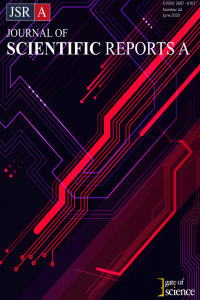DÜŞÜK DOZ İYONİZE RADYASYONUN RADYOLOJİ ÇALIŞANLARININ TİROİD HORMONLARI VE SERUM KOLESTEROL SEVİYELERİ ÜZERİNE ETKİSİ
: Radyoloji çalışanları, iyonize radyasyon, serum lipid, tiroid hormon
EFFECTS OF LOW DOSE IONIZING RADIATION ON BLOOD SERUM LİPİD AND THYROID HORMONE LEVELS OF THE RADIOLOGY WORKERS
: Radiology workers, ionizing radiation, serum lipid, thyroid hormone,
___
- [1] Health risks from exposure to low levels of ionizing radiation- BEIR VII. Washington DC: National Academies Press, (2005).
- [2] S.K. Soldatov, I.B. Ushakov, “Low doses of ionizing radiation and short- and long-term hematologic changes”, Med. Tr. Prom. Ekol, 9, 20-23 (1995).
- [3] H. Engler, W.F. Riesen, “Effect of thyroid function on concentration of lipoprotein”, Clin. Chem, 39(12), 2466-2469 (1993).
- [4] F.M. Ruggiero, F. Cafagno, E. Quagliariello, “Exchange of free cholesterol between plasma and erythrocytes from hyperthyroid and hypothyroid rats in vivo”, Lipids, 25(9), 529-533 (1990).
- [5] R.L. Gebhard, B.G. Stone, J.P. Andreini, W.C. Duane, C.D. Evans, W. Prigge, “Thyroid hormone differentially augments biliary sterol secretion in the rat”, “I. The isolated-perfused liver model”, J. Lipid. Res, 33, 1459-1466 (1992).
- [6] J.H. Sellin, R. Vasilopoulou-Sellin, “The gastrointestinal tract and liver in hypothyroidism”, L.E. Brauerman, R.D.Utiger, Werner&Ingbar’s the Thyroid: A fundamental and clinical text. 8th. ed. Philadelphia, Lippincott Williams&Wilkins, 795-799 (2000).
- [7] PP Chaialo, GM Chobat'ko, IV Shimelis, BP Prevarskii: Content of blood lipids and charecteristics of dyslipoproteinemias in people exposed to radiation during the accident at the Chernobyl nuclear povver station. Ukrainskii Biokhimicheskii Zhurnal 63:93-96, 1991.
- [8] P.P. Chaialo, N.N. Lialhovchuk, G.M. Chobat'ko, P.A. Voziian, I.U.D. Kholodova, “The composition and physicochemical properties of the blood lipoproteins in rats exposed to external gamma irradiation”, Ukrainskii Biokhimicheskii Zhurnal, 64, 26-32 (1992).
- [9] Q. Zhang, J.Z. Hu, D.N. Rommereim, M.K. Murphy, R.P. Phipps, D.L. Huso, J.F. Dicello, “Application of high resolution 1H MAS NMR spectroscopy to the analysis of intact bones from mice exposed to gamma radiation”, Radiat. Res, 172(5), 607-616 (2009).
- [10] S. Serhatlıoğlu, A.T. Ozan, F. Gürsu, A. Gödekmerdan, A. Ayar, E. Oğur, “İyonizan radyasyonun radyoloji çalışanlarının Bağışıklık düzeyleri ve kan biyokimyası üzerine etkileri”, Tanısal ve Girişimsel Radyoloji, 10, 97-102 (2004).
- [11] H. Karagül, A. Altıntaş, U.R. Fidancı, T. Sel, “Klinik Biyokimya 1. Baskı”, Medisan, Ankara, (2000).
- [12] T.M. Gueorguıeva, and I.P. Gueorguıev, “Serum cholesterol concentration around parturition and in early lactation in dairy cows”, Rev. Med. Vet, 148, 241-244 (1989).
- [13] M.G. Larsson, “Determination of free thyroxine and cholesterol as a new screening test for canine hypothyroidism”, J. Amer. Anim. Hosp. Assoc, 24, 209-217 (1988).
- [14] S. Valdermarsson, P. Hansson, P. Hedner, P. Nılsson-Ehle, “Relations between thyroid function hepatic and lipoprotein lipase activities and plasma lipoprotein concentrations”, Acta. Endocrinol, 104, 50-56 (1983).
- [15] R.E. Übrahim, M.A. Maglad, S.E.I. Adam, T.E. Mirghani, I.A. Wasfi, “The effect of altered thyroid status on lipid metabolism in nubian goats”, Comp. Biochem. Physiol, 77, 507-512 (1984).
- [16] A.E. Hak, H.A.P. Pols, T.J. Visser, H.A. Drexhage, A. Hofman, J.C.M. Witteman, “Subclinical hypothyroidism is an independent risk factor for atherosclerosis and myocardial infarction in elderly women”, The Rotterdam Study, Ann. Intern. Med, 132, 270-278 (2000).
- [17] S. Miura, M. Litaka, H. Yoshimura, et al. “Disturbed lipid metabolism in patients with subclinical hypothyroidism Effect of L-thyroxine therapy”, Internal. Medicine, 33, 413-417 (1994).
- [18] G.J. Canaris, N.R. Manowitz, G. Mayor, E.C. Ridgway, “The Colorado thyroid disease prevalence study”, Arch. İntern. Med, 160, 526-534 (2000).
- Başlangıç: 2020
- Yayıncı: Kütahya Dumlupınar Üniversitesi
Halil KUNT, Hayri DAYIOĞLU, Muhammed Kasım ÇAYCI
ASENKRON MOTORUN BOYUNDURUK VE DİŞ BOYUTLARININ MOTOR PERFORMANSINA ETKİLERİ
Asım Gökhan Yetgin, Mustafa Turan, Ali İhsan Çanakoğlu
EMET VE HİSARCIK BÖLGESİ (KÜTAHYA) YERALTI SUYU KALİTESİNİN İNCELENMESİ
Cem TOKATLI, Gülçin ACAR, Esengül Köse, Arzu Çiçek, Hayri Dayıoğlu
KESİCİ UÇLAR VE KESME PERFORMANSININ TEK EKSENLİ BASMA DAYANIMINA ETKİSİ
APACHE HADOOP VE DAĞITIK SİSTEMLER ÜZERİNDEKİ ROLÜ
Gürcan Yavuz, Sevcan Aytekin, Muammer Akçay
BAZI M(BENZOİL KLORÜR)2Ni(CN)4 BİLEŞİKLERİNİN FT-IR SPEKTROSKOPİK İNCELENMESİ (M = Co, Ni ve Cd)
Zeki Kartal, Neslihan Kaya, Semiha Bahçeli
BETONARME ÇELİĞİNİN DEFORMASYONUNUN ÖNLENMESİ İÇİN METOTLAR
